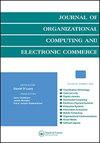中小企业采用移动营销的先决条件:行业差异是否重要?
IF 1.9
4区 管理学
Q3 COMPUTER SCIENCE, INFORMATION SYSTEMS
Journal of Organizational Computing and Electronic Commerce
Pub Date : 2021-07-03
DOI:10.1080/10919392.2021.1956847
引用次数: 11
摘要
尽管诸如移动营销这样的创新为中小型企业(SMEs)提供了一种具有成本效益的营销方法,但大多数中小企业对采用这种创新表现出明显的怀疑态度。为了克服这种采用惯性,需要进行更多的研究。本研究从技术-组织-环境(TOE)框架的理论考虑中,借鉴了一个集成的框架,来研究技术背景(相对优势、复杂性和兼容性)、组织背景(高层管理支持、财务资源松弛和员工移动营销能力)和环境背景(移动营销供应商支持、竞争压力)中的因素如何影响企业对移动营销的影响。和客户压力)预测南非中小企业的营销采用行为。通过比较分析,研究进一步确定行业差异是否会调节制造业和旅游业中小企业之间移动营销采用行为的预测因素。整合框架实证检验的数据随机来自制造业和旅游业的201家中小企业。结果表明,相对优势、复杂性、高层管理支持、竞争压力和供应商支持是南非制造业和旅游业中小企业采用移动营销的关键驱动因素。然而,研究结果不仅显示了制造业和旅游业中小企业采用移动营销的不同预测因素:他们还强调了不同行业采用创新的显著决定因素的相对重要性,这表明行业差异在研究的两个中小企业部门的移动营销采用决策中起着重要的调节作用。研究结果的含义,有兴趣促进更有利地采用移动营销在中小企业界面的研究人员和从业者进行了讨论。本文章由计算机程序翻译,如有差异,请以英文原文为准。
Antecedents of mobile marketing adoption by SMEs:Does industry variance matter?
ABSTRACT Although innovations such as mobile marketing offer targeting and a cost-effective approach to marketing that could be leveraged by small and medium-sized enterprises (SMEs), most SMEs have shown a noticeable skepticism toward adopting the innovation. To overcome this adoption inertia, more research is necessary. This study draws on an integrated framework with theoretical considerations from the technology–organization–environment (TOE) framework to examine how factors in the technology context (relative advantage, complexity, and compatibility), the organizational context (top management support, financial resource slack, and employee mobile marketing capability) and the environmental context (mobile marketing vendor support, competitive pressure, and customer pressure) predict marketing adoption behavior by South African SMEs. Using a comparative analysis, the study further ascertains whether industry variance moderates the factors predicting mobile marketing adoption behavior between manufacturing and tourism-sector SMEs. Data for the empirical testing of the integrated framework were randomly sourced from 201 SMEs in the manufacturing and tourism sectors. The results show that relative advantage, complexity, top management support, competitive pressure, and vendor support are key drivers of mobile marketing adoption in the overall sample of manufacturing and tourism sector SMEs in South Africa. However, the results not only show different set predictors of mobile marketing adoption between the manufacturing and tourism sector SMEs: they also emphasize that the relative importance of the salient determinants of the innovation’s adoption varies across the industries, suggesting that industry variance plays a significant moderating role in mobile marketing adoption decisions across the two SME sectors that are examined. The implications of the findings for researchers and practitioners interested in promoting a more favorably disposed adoption of mobile marketing at the SME interface are discussed.
求助全文
通过发布文献求助,成功后即可免费获取论文全文。
去求助
来源期刊

Journal of Organizational Computing and Electronic Commerce
工程技术-计算机:跨学科应用
CiteScore
5.80
自引率
17.20%
发文量
7
审稿时长
>12 weeks
期刊介绍:
The aim of the Journal of Organizational Computing and Electronic Commerce (JOCEC) is to publish quality, fresh, and innovative work that will make a difference for future research and practice rather than focusing on well-established research areas.
JOCEC publishes original research that explores the relationships between computer/communication technology and the design, operations, and performance of organizations. This includes implications of the technologies for organizational structure and dynamics, technological advances to keep pace with changes of organizations and their environments, emerging technological possibilities for improving organizational performance, and the many facets of electronic business.
Theoretical, experimental, survey, and design science research are all welcome and might look at:
• E-commerce
• Collaborative commerce
• Interorganizational systems
• Enterprise systems
• Supply chain technologies
• Computer-supported cooperative work
• Computer-aided coordination
• Economics of organizational computing
• Technologies for organizational learning
• Behavioral aspects of organizational computing.
 求助内容:
求助内容: 应助结果提醒方式:
应助结果提醒方式:


